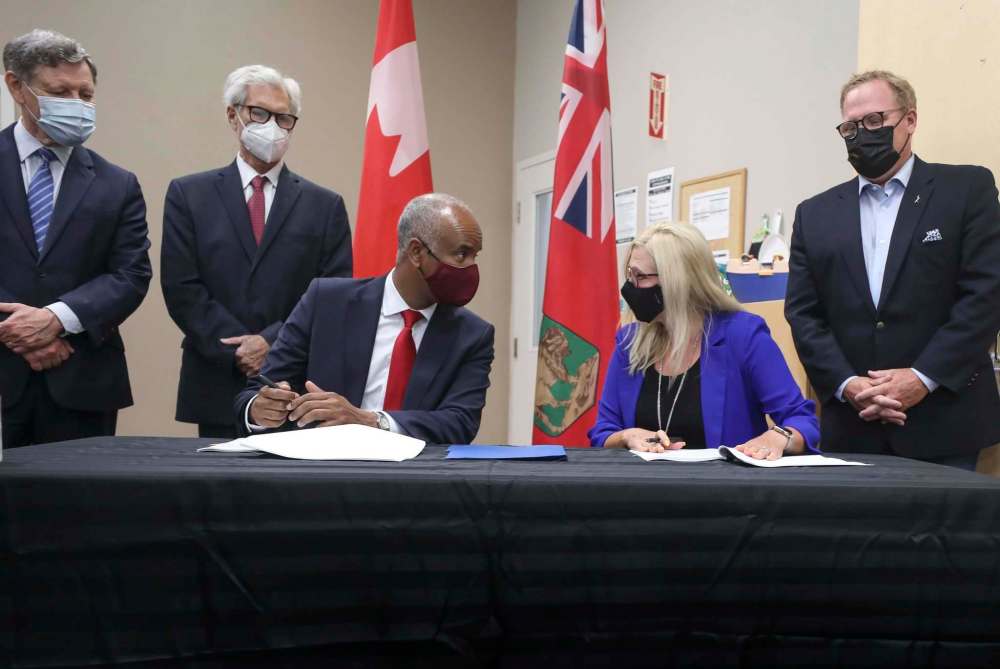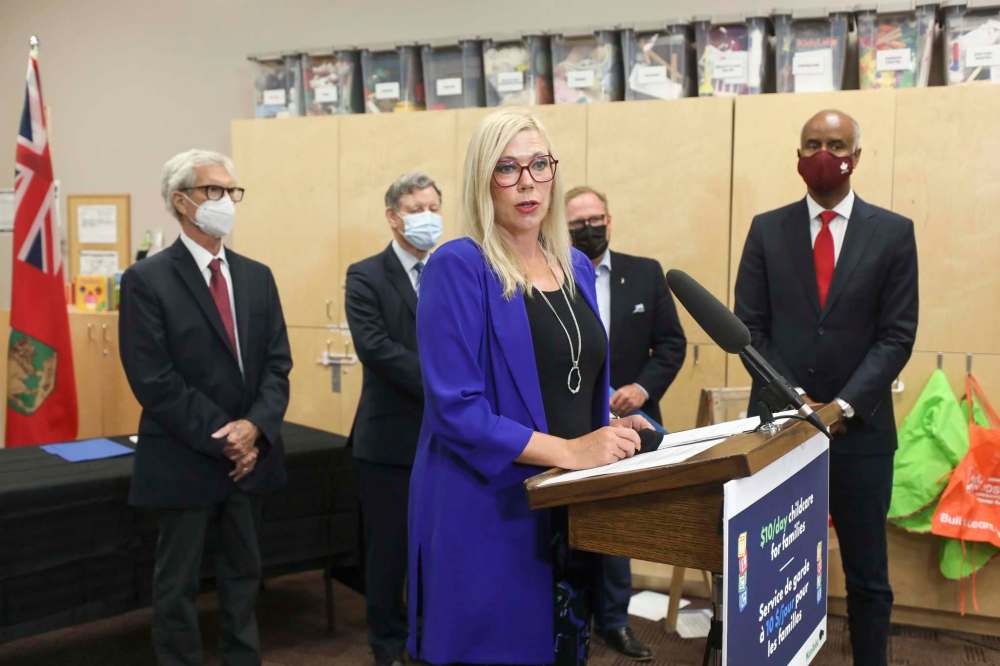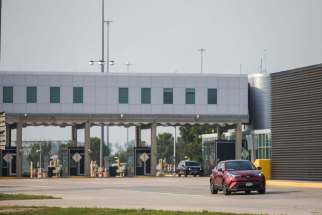Manitoba signs $1.2B child-care deal with feds Advocates, operators optimistic about promised $10-a-day parent fee, increased wages for workers
Read this article for free:
or
Already have an account? Log in here »
To continue reading, please subscribe:
Monthly Digital Subscription
$0 for the first 4 weeks*
- Enjoy unlimited reading on winnipegfreepress.com
- Read the E-Edition, our digital replica newspaper
- Access News Break, our award-winning app
- Play interactive puzzles
*No charge for 4 weeks then price increases to the regular rate of $19.00 plus GST every four weeks. Offer available to new and qualified returning subscribers only. Cancel any time.
Monthly Digital Subscription
$4.75/week*
- Enjoy unlimited reading on winnipegfreepress.com
- Read the E-Edition, our digital replica newspaper
- Access News Break, our award-winning app
- Play interactive puzzles
*Billed as $19 plus GST every four weeks. Cancel any time.
To continue reading, please subscribe:
Add Free Press access to your Brandon Sun subscription for only an additional
$1 for the first 4 weeks*
*Your next subscription payment will increase by $1.00 and you will be charged $16.99 plus GST for four weeks. After four weeks, your payment will increase to $23.99 plus GST every four weeks.
Read unlimited articles for free today:
or
Already have an account? Log in here »
Hey there, time traveller!
This article was published 09/08/2021 (1583 days ago), so information in it may no longer be current.
Shorter waits and lower fees for quality child care in Manitoba are part of the $1.2-billion, five-year deal the province signed with the federal government on Monday.
Federal and provincial officials said the funding will create an additional 23,000 regulated child-care spaces in Manitoba by 2023, with fees averaging $10 a day for children, while increasing wages to recruit and retain underpaid early childhood educators.
“We’re seeing a fundamental change in the funding of child care,” University of Manitoba sociology professor and child-care policy expert Susan Prentice said after the announcement. “There’s going to be no turning back.”
Leaders react to national child-care deal
“This is one of the most important social and economic policy announcements we will make,” said MP Jim Carr, the federal government’s representative for the Prairies and MP for Winnipeg South Centre. He applauded Manitoba’s Progressive Conservative government and his Liberal government — which have had a testy relationship — for being able to “put all kinds of differences aside and focus squarely on the interests of children.”
“This is really a transformative deal for Manitoba families,” said Manitoba Finance Minister Scott Fielding, who attended Monday’s deal signing in his Kirkfield Park constituency.
“It’s a great day for Manitobans. It’s a great day for families,” he said. “We truly value the partnership we have with the federal government to make sure that we can provide a transformative system for child care here.”
“This is one of the most important social and economic policy announcements we will make,” said MP Jim Carr, the federal government’s representative for the Prairies and MP for Winnipeg South Centre. He applauded Manitoba’s Progressive Conservative government and his Liberal government — which have had a testy relationship — for being able to “put all kinds of differences aside and focus squarely on the interests of children.”
“This is really a transformative deal for Manitoba families,” said Manitoba Finance Minister Scott Fielding, who attended Monday’s deal signing in his Kirkfield Park constituency.
“It’s a great day for Manitobans. It’s a great day for families,” he said. “We truly value the partnership we have with the federal government to make sure that we can provide a transformative system for child care here.”
“Quality, affordable child care is essential for families to thrive but over the last five years the PCs have made life harder for families by allowing the waitlist to grow to 18,000 families and freezing funding for centres,” NDP child-care critic Danielle Adams said in a prepared statement. “During the pandemic they raised parent fees for nursery programs, cut inclusion supports for kids with additional needs and sent expired PPE to child-care workers. With a track record like that, Manitoba families don’t trust the PC government to meet their child-care needs.”
“Pallister was a no-show at a $1.2-billion investment that will save child care in Manitoba,” Manitoba Liberal leader Dougald Lamont said in the opening of a prepared statement calling out Premier Brian Pallister for not attending the signing ceremony. Pallister’s press secretary said the premier was not in Winnipeg, but “in rural Manitoba today for a few local announcements/events.”
“Today’s a good day for early learning and child care in Manitoba,” said Manitoba Child Care Association executive director Jodie Kehl. “(The) agreement demonstrates a willingness and partnership between the province of Manitoba and the government of Canada to make child care a priority in our province.”
Manitoba agreeing to work with Ottawa to make child care a priority was heartening news, said child-care advocates and operators.
“Hearing what we’re hearing today gives me cause for optimism,” said Kent Paterson, president and CEO of YMCA-YWCA Winnipeg, which operates 30 child-care centres in and around Winnipeg that care for 1,400 children.
“At first glance, Manitoba’s agreement appears to contain the foundational elements needed to build and support a balanced system — public planning, equitable expansion, emphasis on affordability and… the focus on quality improvement, including workforce recruitment and retention,” said Jodie Kehl, executive director of the Manitoba Child Care Association.
For decades, champions of child care have called for government to support regulated child care. Their calls are finally getting some action, federal Families Minister Ahmed Hussen said Monday after signing an agreement in Winnipeg with his Manitoba counterpart, Rochelle Squires.
“For many years, provinces and territories have been saying, ‘We need the federal government to step up in a big way,'” Hussen said at a centre run by the YMCA-YWCA, the largest child-care provider in the province. “We’ve done what provinces and territories asked of us.”
Federal officials have been announcing agreements across Canada in recent weeks to create a national child-care system. Manitoba became the sixth province — and the second one led by a Progressive Conservative government, after Prince Edward Island — to sign a national child-care deal, following Quebec, British Columbia, Nova Scotia, Newfoundland and Labrador, and Yukon. The $30 billion over five years will help provinces get a national system on board, Hussen said. It will be followed by $9.2 billion a year in permanent funding.

“I think this will prompt the kind of changes and and transformations we need to see,” Prentice said Monday. “So I’m going to bet on the optimistic scenario. But I will be watching closely.”
Squires said the child-care agreement is the largest in Manitoba history and, unlike other provinces, includes children age six and under — an “innovation” policy analyst Prentice praised.
“It was a very good call to realize six-year-olds need to be part of the program; six is when compulsory school starts,” Prentice explained. “Going right up to the compulsory school age was very smart on the province’s part.”
Manitoba has committed to an average $10-a-day parent fee for children six and under, Squires said, and is closer than most provinces to hitting that target.
“Manitoba already has the second-lowest parent fees in the country,” she said. “We anticipate the potential of being the first province to reach this $10-per-day average.
“It’s particularly important as we continue to recover from the pandemic, which disproportionately impacted women and female employees in our province.” – Families minister Rochelle Squires
“We know many low- and middle-income Manitobans need additional support so they can access safe, high-quality early learning and child-care spaces so that they can fully participate in our growing economy,” she said. “It’s particularly important as we continue to recover from the pandemic, which disproportionately impacted women and female employees in our province.”
Manitoba may have the second-lowest fees in Canada, but they’re still not affordable for all families, said Kehl. The creation of 23,000 new spaces is “an ambitious target,” she noted, especially when the Online Child Care Registry’s last public report in June 2018 said there were more than 16,600 children waiting for a space; the need has increased since then. The largest obstacles — outside of capital and operating funding, which appear to be in the new child-care deal — will be the labour force, she said.
Squires said the province is raising the low-income threshold for child-care subsidies so 6,000 more families can access full subsidies, and raising the wage floor for Level 2 early childhood educators (ECEs) to $25 an hour to attract and keep more skilled professionals in order to expand the number of spaces in the system.
If Manitoba is going to recruit and retain skilled workers, it has to pay them a living wage, said the U of M’s Prentice, citing examples of early childhood educators in Manitoba having to take seconds jobs and those who are parents not being able to afford child care.

The current average wage for qualified workers is well below $25 an hour, Kehl said.
The last time the Manitoba Child Care Association surveyed its members, the 61 per cent who responded said they pay their childhood educators less than the association’s Market Competitive Salary Scale (2016-2017); hourly range on that scale is $18.87 to 23.59, Kehl said.
“An average wage floor of $25 an hour will be instrumental in recruiting and retaining the educated, knowledgeable ECEs” needed to implement a high-quality early learning program, Kehl said.
“It’s really important to elevate the profession — to allow us to bring people into the profession and retain them,” said the YMCA-YWCA’s Paterson, noting $25 an hour would be an increase in pay that would help. “A stable workforce is absolutely key to quality child care.”
carol.sanders@freepress.mb.ca

Our newsroom depends on a growing audience of readers to power our journalism. If you are not a paid reader, please consider becoming a subscriber.
Our newsroom depends on its audience of readers to power our journalism. Thank you for your support.








